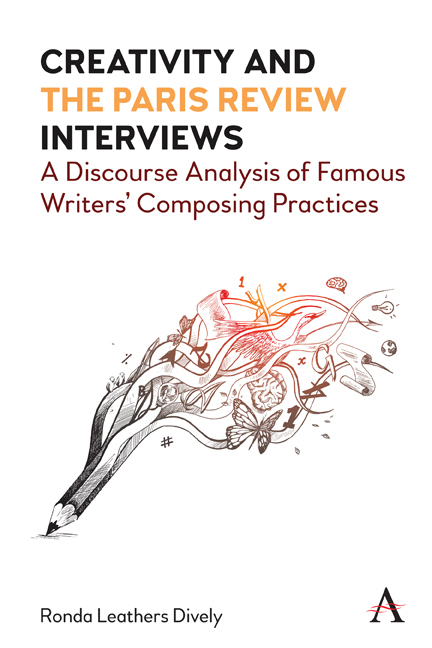 Creativity and 'the Paris Review' Interviews
Creativity and 'the Paris Review' Interviews Book contents
- Frontmatter
- Contents
- List of Illustrations
- Preface
- Acknowledgments
- 1 Impetus, Contexts and Methods
- 2 Composition through the Lens of Creativity Theory
- 3 First Insight, or the Glimmer of Possibility
- 4 Preparation, or Research Broadly Conceived
- 5 Incubation, or Breaks from Conscious Attention
- 6 Insight, or the Eureka Experience
- 7 Verification, or Evaluation
- 8 Emergent Patterns
- 9 Implications for Writing Instruction
- Appendix A Coding Table
- Appendix B List of Cited Paris Review Interviewees
- Appendix C Diagram of Analytical Categories, Subcategories and Themes
- References
- Index
9 - Implications for Writing Instruction
Published online by Cambridge University Press: 27 April 2022
- Frontmatter
- Contents
- List of Illustrations
- Preface
- Acknowledgments
- 1 Impetus, Contexts and Methods
- 2 Composition through the Lens of Creativity Theory
- 3 First Insight, or the Glimmer of Possibility
- 4 Preparation, or Research Broadly Conceived
- 5 Incubation, or Breaks from Conscious Attention
- 6 Insight, or the Eureka Experience
- 7 Verification, or Evaluation
- 8 Emergent Patterns
- 9 Implications for Writing Instruction
- Appendix A Coding Table
- Appendix B List of Cited Paris Review Interviewees
- Appendix C Diagram of Analytical Categories, Subcategories and Themes
- References
- Index
Summary
The select anecdotes and observations woven into the preceding chapters merely hint at the hours of entertainment The Paris Review (PR) interviews will afford those who are intrigued by famous authors and the circumstances that shaped their careers. For readers looking to grow as writers, the interviews yield countless lessons in composing, and, as Chapter 1 demonstrates, more than a few aspiring authors have cherry-picked the interviews for that purpose. Adopting a more comprehensive and systematic approach to mining this rich repository of composing advice, the study detailed in this book analyzes a large sample of the interviews for patterns in author experience and practice, with the ultimate goal of entertaining their relevance for individualized and large-scale expository writing pedagogy. Of course, the findings reported near the end of Chapter 8 combine for a mixed review of formal creative writing instruction, as several interviewees contend that gains produced by writing courses are negligible, while others attribute such courses with a variety of benefits. Despite these authors’ attitudes about creative writing classes, they are staples in the contemporary university, as are required courses in expository composition, and teachers are always searching for strategies that can assist them in educating their students.
As for the expository composition classroom (the focus of this chapter), pedagogical theories have waxed and waned across the last several decades, resulting in fluctuating emphases. Interest in composing processes flourished during the late 1970s and 1980s, soon inviting important and ongoing qualifications and elaborations regarding the extracognitive, social aspects of writing (see Chapter 1 for more on such concerns). Of course, the discipline's evolution in this respect is by no means a sorry development; on the contrary, alternate theories have illuminated important aspects of writing that overzealous and undernuanced process instruction largely ignores. The fear, though, is that in the presence of alternate theories, process instruction may become too vague, too limited and too inconsistent to realize its promise. Reassuringly, the recent onslaught of research on metacognition, knowledge transfer and neurobiology (again, see Chapter 1) demonstrates a revived interest in the nature of composing processes and how best to nurture them.
- Type
- Chapter
- Information
- Creativity and 'the Paris Review' InterviewsA Discourse Analysis of Famous Writers' Composing Practices, pp. 149 - 168Publisher: Anthem PressPrint publication year: 2022


